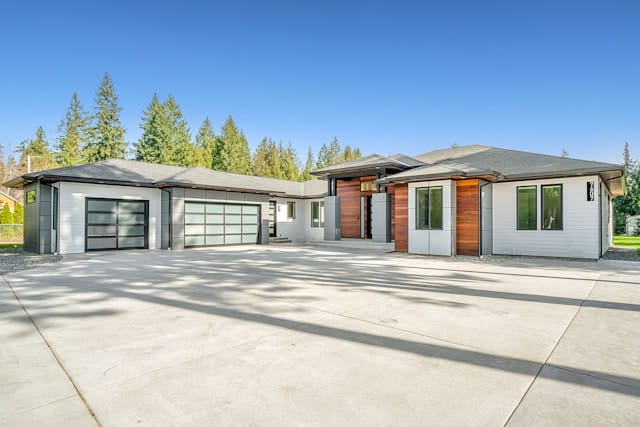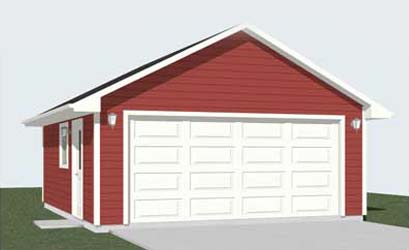We live in a world where it is more important than ever to be conscious about the environment around us. Many homeowners and business owners are stepping up to the plate and taking action to reduce their carbon footprint, minimizing individual impacts on the planet. We often focus heavily on the homes, but what about your detached garage plans?
The good news is that with a few simple steps, you can make your detached garage more eco-friendly. If you’re just getting started with planning, it’s the perfect time to incorporate these ideas into your garage project.
Construction Materials for Detached Garage Plans
Let’s start with your construction materials. You’ve got the plans and you’ve designed a stunning garage idea. It’s perfect for your space. But what’s next? Choosing eco-friendly construction materials will go a long way in helping with reducing that carbon footprint.
You have so many different options for materials, because there are tons of eco-friendly construction materials out there. You just need to determine what will work for your garage plans and take it from there. Use materials that are sustainable and renewable. Whether you are upgrading, building new, or even just renovating an existing garage, this is a little step that makes a big impact.
Here are a few great options:
- Reclaimed wood
- Bamboo flooring
- Recycled metal materials
Anything you can use that is recycled is awesome. Also, using materials that don’t have a major environmental impact will be an effective step. Plus, it brings character to your garage space.
Energy-Efficient Lighting
Lighting choices are another good place to focus. Thankfully, technology gives us a lot of fantastic options here. You can use smart lightbulbs and systems and make sure you reduce your energy consumption overall. Most new or modern light fixtures use LED or CFL, but you may want to look for these classifications.
Certain types of lights will help to reduce energy usage while also lowering your utility costs. With smart sensors and technology, you can set up lights that only come on when there is motion. Some lights adjust the brightness based on daylight. You can also set up timers to automatically turn lights off or on.
All of these little things can help conserve energy. This helps both you and the planet.
Maximize Natural Light
To piggyback on lighting solutions, what about natural light? If you have windows or areas that can let natural light in, this is a big win. You can use those same sources to add ventilation with natural elements, too. Skylights, windows, and translucent panels are all good options for this.
While these will only work when there is daylight and sunshine, they can provide a significant benefit.
Insulation Choices for Detached Garage Plans
Proper insulation will help to provide your space with increased energy efficiency. When it’s warm or hot outside, the insulation will help to better regulate the temperatures inside the garage. So many garages have little to no insulation. You can certainly keep that approach, but it won’t help with efficiency.
Consider the difference between blazing hot summer temperatures or a more regulated garage environment. You can maintain a more comfortable temperature year-round. Using quality insulation will improve efficiency for garage use while also providing comfort and even some soundproofing qualities.
What About Solar Panels?
You can utilize solar panels to help provide clean energy solutions. This will be a separate expense from your garage plans, but it’s a great addition. Solar panels provide clean and renewable energy. You can use that energy for lighting, tools, electrical needs, and more. It takes pressure off the grid and helps reduce your carbon footprint too.
Eco-Friendly Paint Materials
When you’re shopping for paint colors or even sealants for the surfaces in your garage, that’s another opportunity for you. Look for paints and sealants that are classified as low-VOC or even zero-VOC. VOC stands for volatile organic compounds. When materials are made with low or no amounts, they offer many benefits.
That means the sealants and paints have fewer harmful chemicals. They can even improve your air quality.
Add Plant Sustainability
Have you heard of a green roof? What about living walls? Both of these methods use plants for sustainability and improved air quality. Your detached garage can benefit from adding vegetation to your space. A green roof can help reduce stormwater runoff and even provide a wildlife habitat in a limited sense.
Living walls are inside, but they bring fresh air and plant life to the interior. They make a statement and work for decorative purposes. These efforts will improve your aesthetics while promoting biodiversity.
Spinning off of these plant options, you can harvest rainwater as well. This isn’t required, but it may be beneficial to your efforts. When you harvest rainwater, you can use that to water plants or wash your vehicles and conserve water in those areas.
Let Us Help with Detached Garage Plans
Creating a garage that meets your needs and provides an environmentally friendly space is an awesome concept. There are so many things you can incorporate that are mutually beneficial. Take advantage of sustainable practices, maximize natural light or ventilation, and take the time to learn about energy-efficient technology for your space. Each of these are good, but don’t forget eco-friendly materials. That will be one of the biggest steps you can take.
Check out our selection of detached garage plans. We’re here to help you create the perfect plan for your garage project.

